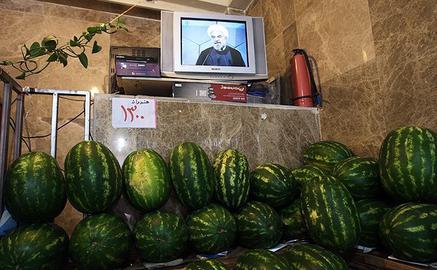When Iran's nuclear negotiating team was headed by Hassan Rowhani, the country came closer than it ever has before or since to securing a compromise with the West, preserving Iran's right to a nuclear program and ending years of political isolation. Was that near success a reflection of Rowhani's skill and authority as a negotiator, or simply the political climate of the time, an era in which both the West and Iran's top leadership were both more dedicated to a deal? To find out, we spoke to former British foreign secretary Jack Straw, who sat across the table from Rowhani during those golden days of possibility. Straw has high praise for Rowhani and is sharply critical of forces in the United States who did their best to undermine an agreement.
How much authority did Rowhani seem to have in negotiations? You describe in your book a stand-off in Tehran between the Iranian team and the three EU foreign ministers, during which Rowhani gets on the phone and comes back and does a deal that resulted in the Tehran Declaration.
When Dr. Rowhani was across the table it was pretty clear he had authority. Hossein Mousavian deals with our October 2003 meeting in his book, and he confirms that obviously they needed to talk to the Supreme Leader's office and the Supreme Leader himself.
He's reputed to be quite sophisticated and easy to talk to, how did you find him personally?
He was always very courteous, clearly determined to represent the interest of both the Iranian people and the Islamic Republic. But also just as we were representing our own interests, he did that pragmatically.
Do you recall how comfortable Dr. Rowhani speaking English? Was he at ease, or was his English rough?
I can't honestly remember what his facility was in English, because all this stuff was so technical, even those who spoke perfect English on the Iranian side or perfect Farsi on our side used interpreters. It's really dangerous to try and negotiate in another language, unless you are absolutely fluent. But I don't recall his English being as smooth as Mousavian's for example.
Did it seem like Rowhani was personally determined to strike a deal, as opposed to simply sitting at at the table and saying no?
The difference is that the environment was different, because both sides wanted a deal and felt they could get one. The E3 formation actually gave us greater flexibility than the E3 +2. Mousavian and Kamal Kharrazi would say that we were their human shield, we wanted a deal and were not American neo-cons. Part of the problem was that deal the Iranians wanted required cooperation from America, like spare parts; but even on fundamental issues of suspension and not abandoning enrichment, both sides recognized the importance of deal. It's tragic that for a variety of reasons that momentum was lost and lost again in early part of 2005.
Was he an imaginative negotiator?
He was clearly in charge, and extremely professional, but as to the dynamics of the Iranian delegation I cannot offer a view. There were others at the time who were much better at monologues, the Greek Cypriot foreign minister at the time used to go on for an hour at a time about the iniquities of the Brits.
You take the refreshing position in your book that it was a 'manageable' problem to end Iran's diplomatic isolation, but that the Israeli right and its allies in Washington were essentially in the way. Do you think that's still true today, or has Iran itself taken up bigger share of the blame?
Well John Bolton and the neo-cons got what they wished for, they undermined President Khatami and seriously damaged the credibility of the reformists by, in Larijani's words, delivering candies at best. So of course the environment has hardened around sort the Israeli and American right view of Iran, so solutions become that much more difficult – but in my view that makes it that much more urgent. There's no point pretending there's a Syria solution without involving Iran.
visit the accountability section
In this section of Iran Wire, you can contact the officials and launch your campaign for various problems
























comments